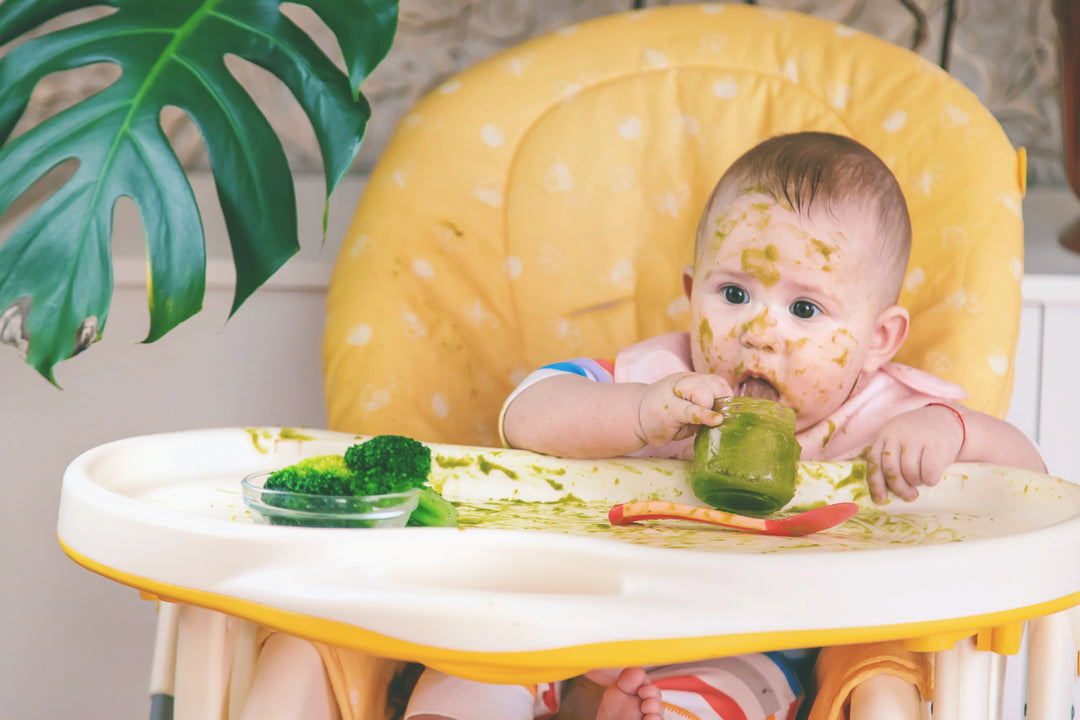Starting Solids: Why Family Meals Matter, And When They Don’t
Do family meals really matter when you’re starting solids?
Dinner is ready, everyone is at the table, and just as you reach for your fork your baby smears yogurt in their hair and tosses food on the floor. Family meals with a baby can feel messy, unpredictable, and sometimes impossible. You may wonder if they really make a difference. You may have also heard that family meals help your child’s growth and development. So how important are they, really?
The truth is, family meals do matter, but not in the “every single night at six o’clock” way you might imagine. Family meals help kids eat more balanced diets, build stronger relationships, and even lower the risk of some health problems later in life. Babies don’t just learn to eat from what’s on their tray. They are watching you eat, talk, laugh, and connect with others. That is how they learn what food is and what mealtime means.
As both a pediatrician and a parent, I want to take away some of the pressure. The short answer: family meals with your baby are important, but they do not have to be perfect. They don’t even need to happen every day. What matters most is exposure, connection, and creating a positive foundation for years to come.
In this article, we’ll look at how family meals can grow with your baby in the first couple of years, what research shows, and how to let go of the guilt when dinner does not look the way you imagined.
How family meals help babies learn what eating is all about
Family meals are about more than food. Research shows that children who regularly eat with their families tend to:
-
Eat more fruits, vegetables, and balanced foods
-
Develop stronger language and social skills
-
Have healthier routines and fewer risky behaviors as they grow older
These benefits come from many shared meals over time, not one perfect dinner. Missing a few meals here and there will not take away the progress you are building.
Helpful resources:
The HealthyChildren.org article gives simple advice like turning off screens, keeping meals easy, and involving kids in food prep.
This AAP Pediatrics article shows that frequent family meals can lead to better diets and long-term health benefits.
Screen-free moments: The secret ingredient for connection at the table
One more important point: meals work best when they are screen-free. Turning off the TV and putting away phones helps everyone focus on food and conversation. Babies notice this too, and they learn that mealtime is a special time to connect.
Bringing baby to the table when starting solids

6 to 9 months: Exposure over expectations
Around six months of age, most babies are developmentally ready to start solids. If you have questions about the developmental readiness of your baby, check out this article. Breast milk or formula is still the main source of nutrition, but being at the table is important. Babies are natural observers.
Making family meals work in the early months
-
Goal: Exposure, not how much they eat
-
What it looks like: Place your baby in a highchair at the table while the family eats. Offer small tastes of safe food (soft, mashed, or modified versions of your own meal).
-
Why it matters: Babies learn that meals are a time to gather, sit, and connect.
Parent tip: Do not stress if your baby only plays with the food or spits it out. The early months of eating are messy on purpose. Even five to ten minutes at the table matters.
9 to 12 months: Curiosity turns into connection
By nine months, many babies want to take part in the meals. They reach for finger foods, bang spoons, and look at your plate with curiosity. This is a great time to add more flavors and textures. If you are unsure what foods are safe or ok, this article can help guide you.
Simple ways to let your baby join family mealtime
-
Goal: Practice and participation
-
What it looks like: Offer safe, baby-friendly versions of your meals. For example, shredded chicken instead of a whole piece, soft steamed vegetables rather than raw.
-
Why it matters: Mealtimes become about connection, not just calories. Babies learn curiosity and trust when they share food with you.
Parent tip: Try “double dipping.” Give your baby a piece of what you are eating (prepared safely) along with some of their usual favorites. Variety without pressure helps build adventurous eaters.
12 months and beyond: From first foods to family rituals
By age one, your child’s diet may look a lot like yours. Meals are less about experimenting and more about joining in.
Encouraging belonging, not just eating
-
Goal: Bonding and social learning
-
What it looks like: Toddlers may only stay at the table for 10–15 minutes, sometimes less. But in that short time they absorb language, social cues, laughter, and the feel of being together.
-
Why it matters: Research suggests that toddlers who regularly eat with their families tend to have better dietary patterns and feel more secure in mealtime settings.
Parent tip: Keep expectations realistic. Your toddler may drop food, refuse items, or wander off. That is totally normal. The “win” is that they joined in the family ritual.
When family meals don’t happen (and why that’s perfectly okay)

Life with little kids is unpredictable. Work schedules, naps, sports, and plain old tiredness can make daily dinners impossible. Missing family meals is not failure.
Easy ways to create mealtime connection, no matter when you eat
-
Breakfast counts. Family meals are not only about dinner. A weekend pancake breakfast together can be just as meaningful.
-
Snacks count too. Sitting down to share a snack with your baby helps build the same habits—and it can be one-on-one rather than the whole family.
-
On-the-go meals count. Think of a picnic at a sibling soccer game, a packed lunch on a family hike, or even a weekly pizza night or drive-through tradition. Connection matters more than the setting or the menu.
Focus on quality, not quantity. Babies benefit most when family meals feel calm and enjoyable. If the routine is stressful, it is okay to step back.
Remember: What matters is the pattern over time, not the daily scorecard.
Gentle tips for making starting solids and family meals feel good
-
Model what you want to see. Babies learn by watching you. Take bites, chew slowly, and show enjoyment.
-
Offer without forcing. You provide the food, your child chooses what and how much to eat.
-
Get them involved. Let them stir, add sauce, or mix with a spoon. Helping with prep builds excitement.
-
Keep meals short. Ten minutes is plenty for a baby. Over time, they will stay longer.
-
Invite them in, even if they do not eat. Sitting at the table banging a spoon is still part of the learning process.
-
Make it safe. Supervise always, avoid choking hazards like whole grapes or nuts, and cut foods to safe sizes.
-
Ask open-ended questions. Instead of “Did you like it?” try “What part was your favorite?” or “What colors do you see on your plate?” This helps build conversation and engagement.
The long view: What matters most in your baby’s feeding journey

The magic of family meals does not come from one perfect dinner. It comes from the rhythm of connection built over years. Your six-month-old watching you eat, your nine-month-old trying a bite of your food, your toddler asking for “more please.” These small moments add up.
The American Academy of Pediatrics encourages families to include shared meals when possible, but not at the cost of guilt or stress. Research shows that frequent family meals are helpful, but only when the mood is positive and supportive.
So let go of the pressure to create a picture-perfect dinner table every night. Invite your baby to the table when you can. Keep things light. And trust that even short, messy, imperfect meals are creating the foundation for a lifetime of healthy eating and family connection.

Written by Dr. Michelle Shiffman, MD
Pediatrician & Advisor at Bébé Foodie
Dr. Michelle Shiffman is a board-certified pediatrician based in Denver, Colorado. She brings her expertise in early development, food introduction, and culturally-sensitive care to Bébé Foodie, where she supports the creation of our evidence-based content and contributes to our expert panel. Michelle’s favorite part of her work is connecting with families during infant and toddler visits—especially when it comes to discussing developmental milestones and feeding. As a mom herself, she's also experienced the ups and downs of starting solids and managing picky eating.





Leave a comment